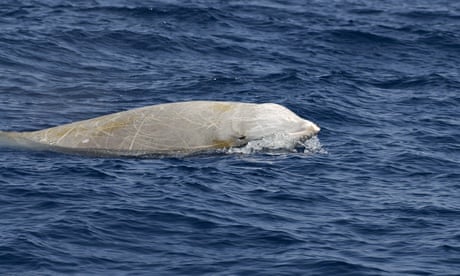Months before oil exploration is slated to begin in the Canary Islands, the World Wide Fund for Nature (WWF) is calling on the Spanish government to abandon the search for oil and instead create a sanctuary for whales and dolphins in the region.
The waters off the islands of Lanzarote and Fuerteventura are home to nearly a third of the world's cetacean species. "We're talking about an area that's Europe's richest when it comes to whales and one of the top in the world," said WWF Spain's secretary general, Juan Carlos del Olmo.
The group launched its campaign just as the Spanish oil and gas company Repsol announced that exploratory drilling in the region could start as early as October. If the project moved forward, Del Olmo said, oil extraction would put the whales and dolphins at constant threat of oil spills, contamination and loud noises.
Since the launch on Tuesday, more than 5,000 people have signed a petition backing the campaign.
Del Olmo said the idea had come from the Spanish government. In 2011, concerned about the death of several whales in the region due to noise pollution, the environment minister examined the possibility of creating a protected zone. "What we've done is simply take the government's own proposal and said, listen, here is scientific data showing that this zone is vital for whales and it just happens to be where Repsol has a permit to prospect for oil."
Plans to explore for oil in the region have been vigorously opposed by many across Spain, including environmental groups and locals who worry that it could jeopardise tourism, one of the principal drivers of the regional economy. Last month, Spain's supreme court threw out several challenges against the project, paving the way for the exploration to go forward.
Last week, the Repsol spokesperson Marcos Fraga said the company "respected" the protests, but the strong reaction was premature. The company was simply looking to determine whether the oil reserves existed and the costs associated with accessing them. "From there, we can open a quiet, calm debate regarding the pros and cons, to take a decision as a company, as a society and as a country," Fraga told Teide Radio. "But the discovery of hydrocarbons would be good news for the country," he added.
On Tuesday, Spain's industry and tourism minister, José Manuel Soria, described the exploration as necessary, saying that Spain "cannot afford the luxury" of not knowing whether it has gas or oil reserves in its territory. Spain imports 99% of its hydrocarbons. "Just knowing whether these reserves are available is a strength for the Spanish economy," he told a business forum.
Oil exploration would take place at least 30 miles from the shore, next to where Morocco is prospecting for oil. It would be ridiculous, Soria said, if Morocco found oil or gas while Spain refused even to investigate the idea.
Soria, who is from the island of Gran Canaria, pointed to the 33% unemployment rate on the Canary Islands as a reason to move forward with exploration. "It's not because there's a crisis, but rather because there just isn't any industry there."
Del Olmo dismissed the minister's link between oil exploration and Spain's fragile economy. "Betting on oil is betting on the past," he said. "The future of the Canary Islands isn't in installing oil platforms off its coasts, but rather in cultivating quality tourism, nature conservation and renewable energies."
